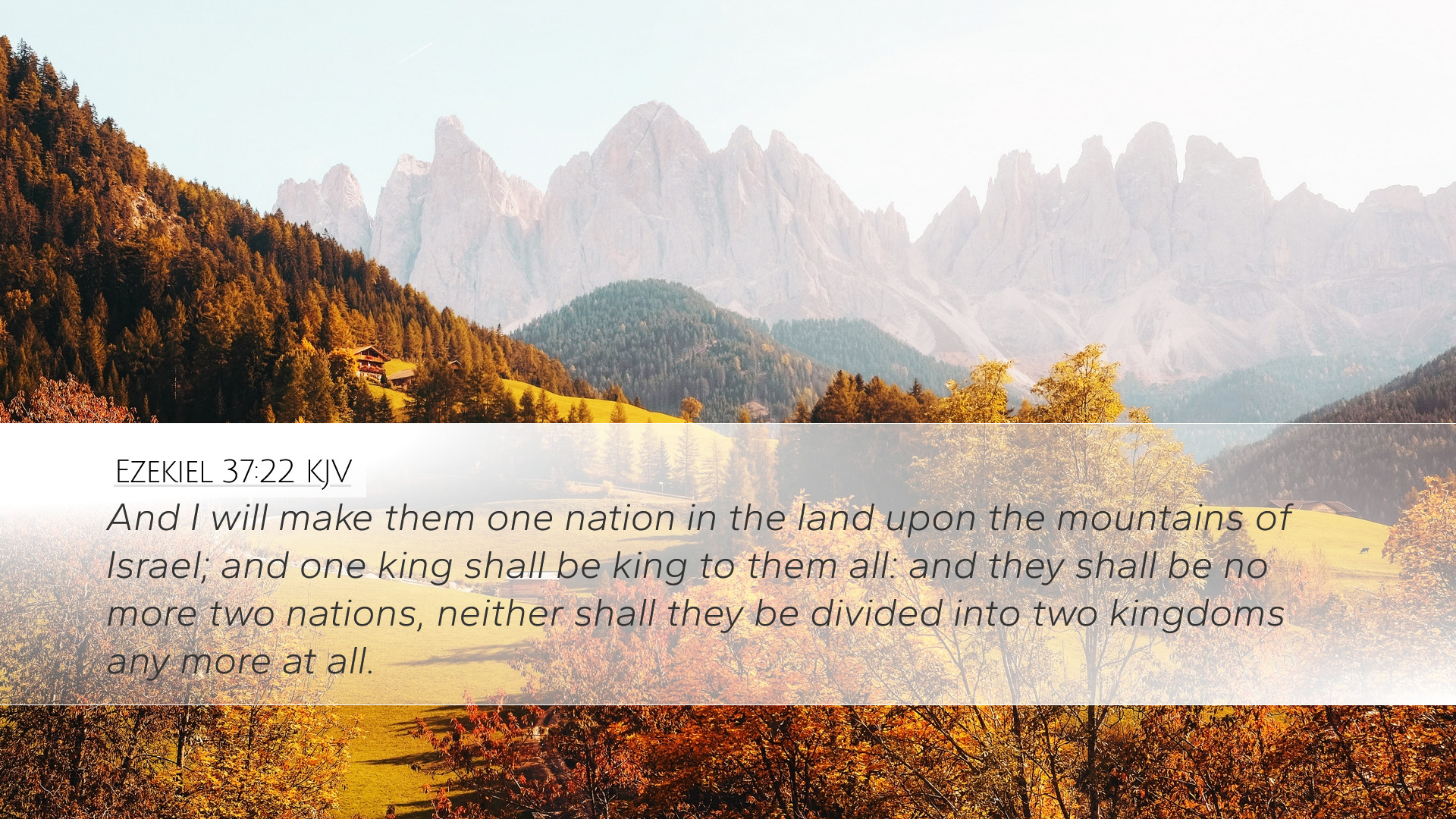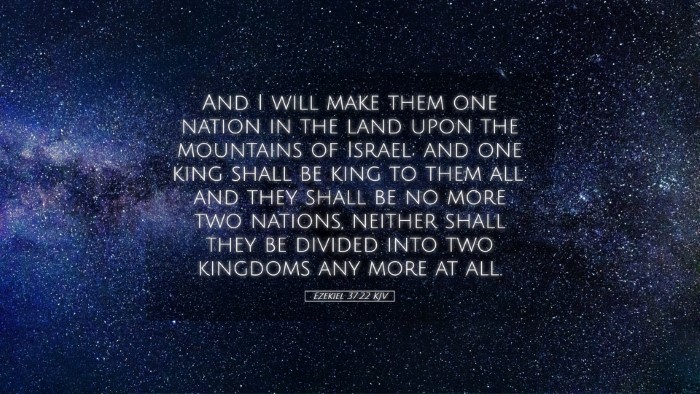Ezekiel 37:22 Commentary
Verse: "And I will make them one nation in the land upon the mountains of Israel; and one king shall be king to them all: and they shall be no more two nations, neither shall they be divided into two kingdoms any more at all." (Ezekiel 37:22)
Introduction
This pivotal verse in Ezekiel's prophecy encapsulates the promise of unity among the divided kingdoms of Israel and Judah. In this commentary, we will explore interpretations and insights from respected public domain scholars such as Matthew Henry, Albert Barnes, and Adam Clarke. Their perspectives illuminate the theological implications of this passage for understanding God's redemptive plan for His people.
Thematic Overview
Unity in Divinity: This verse prophetically envisions a time of restoration when God's people will no longer be fragmented by political or spiritual divides. The phrase "one nation" signifies a divine orchestration of unity that transcends human divisions.
Excerpted Insights from Commentaries
Matthew Henry's Commentary
Henry remarks on the historical context of the verse, noting the division following Solomon's reign which led to the establishment of separate kingdoms. He emphasizes that God's intention is to establish a single nation under His sovereignty:
- Historical Division: The split between Israel and Judah was a source of suffering, and this promise serves to bring hope to a war-torn nation.
- Divine Reconciliation: Henry highlights that this prophecy speaks of God's commitment to reconcile His people, symbolizing a deeper relational restoration.
- The Role of 'One King': The prophetic declaration of "one king" foreshadows the messianic kingship of Christ, who would ultimately fulfill this promise by uniting His people in the New Covenant.
Albert Barnes' Notes on the Bible
Barnes expands on the notion of unity, indicating the significance of God's action in bringing the two kingdoms together:
- Spiritual Unity: He asserts that this verse not only speaks to physical unity but also addresses the spiritual restoration of God's people.
- Eschatological Implications: Barnes sees an eschatological interpretation, where the unity becomes fully realized in the church's manifestation as the body of Christ.
- Kingdom Functionality: He illustrates the governance of a singular king, identifying Jesus as the one who reigns over all, effectively administrating peace and righteousness.
Adam Clarke's Commentary
Clarke's interpretation brings further depth, emphasizing God's everlasting covenant with His people:
- Covenantal Assurance: He points out that this unity is rooted in God's covenant promises, highlighting the importance of faithfulness to the Divine.
- Hope for Restoration: Clarke discusses the significance of this prophecy during Israel's exilic period, conveying hope and foretelling an ultimate restoration.
- Universal Scope: He emphasizes that this unification transcends ethnic boundaries, inviting all who believe into this covenant relationship with God.
Theological Significance
The verse has profound theological significance, addressing key concepts such as:
- The Nature of God’s Kingdom: This passage reinforces the notion that God's kingdom is characterized by unity, peace, and diversity under His sovereign rule.
- Messianic Fulfillment: The promise of a singular king is clearly fulfilled in Christ, who is not only the King of Israel but of the entire cosmos, establishing a new kingdom marked by justice and mercy.
- Church as One Body: The implications for the church today are clear; Christ's followers are called to embody this unity, working against divisions that hinder the mission of the Gospel.
Practical Applications
For pastors, theologians, and students, this text provides robust applications:
- Promoting Unity: It challenges church leaders to seek unity not only amongst themselves but also with other denominations and cultures.
- Emphasizing Covenant Relationship: Understanding the importance of living in accordance with God's covenant encourages a lifestyle reflective of His values and character.
- Fostering Hope: This verse serves as a reminder of God's faithfulness, especially in tumultuous times when hope seems lost.
Conclusion
Ezekiel 37:22 offers a profound glimpse into God's redemptive plan for humanity. Through analyses from Henry, Barnes, and Clarke, we see the prophetic nature of the promise of unity in God’s kingdom fulfilled in Christ. As we meditate on this verse, we are called to embrace our role in fostering unity within the body of Christ and sharing this message of hope to a world desperately in need of reconciliation.


